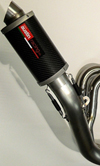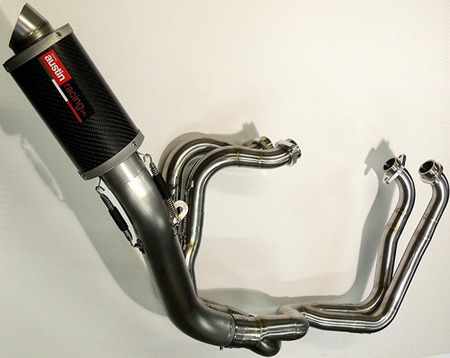Inconel exhaust systems in motorcycle racing
 We have become accustomed to the fact that many race motorcycle exhaust systems are made from titanium. Owing to the fact that they are generally much better supported than on most racecar installations, the problems with fatigue and creep are nowhere near as serious.
We have become accustomed to the fact that many race motorcycle exhaust systems are made from titanium. Owing to the fact that they are generally much better supported than on most racecar installations, the problems with fatigue and creep are nowhere near as serious.
One company, Good Fabrications, with extensive experience of many types of exhaust materials has applied its knowledge of special high-temperature materials used in other race series with great success to motorcycle racing, making the Austin Racing exhausts as used by some Aprilia and BMW entrants in British Superbike racing.
In the British Superbike championship, there is a two-tier set of regulations, with the 'Evo' regulations allowing far less deviation from the standard production specifications in terms of engine tuning. Splitlath Motorsport runs two riders in the series on 1000 cc V4 Aprilia RSV4 machines. Proven to be very competitive in World Superbike, Splitlath had a successful season in BSB Evo, finishing second in the points and its bikes are equipped with Inconel exhausts from Austin Racing, which manufactures the systems in conjunction with British specialist Good Fabrications.
The grade of Inconel is unspecified, but the general wall thickness of the system was 0.7 mm in the beginning, soon progressing to 0.5mm. This according to Austin Racing's Richard Austin means that "the weight is now comparable with the Titanium systems". A typical titanium system is around 1mm wall thickness; a length of 0.5mm Inconel tube of typical bike-racing diameter is around 12% lighter than a 1mm titanium tube of the same length.

The photo here shows an Inconel RSV4 exhaust from Austin Racing. With extensive experience of using Inconel in Formula One exhausts for many years, Good Fabrications knows how to make low-mass reliable systems in this material. Richard Austin offered his opinion on other benefits of Inconel exhausts "Inconel offers other advantages such as longevity and keeping the ambient temperature low, thus helping to keep shock absorbers and the rider's limbs cooler. Inconel fixings on link pipes etc are stronger and less likely to break".
We can be sure that, if titanium offered acceptable durability coupled with a weight saving over Inconel, the Formula One teams would all use titanium. Thin-walled Inconel tubing is expensive and difficult to source in small quantities, so it will probably remain the preserve of specialist Inconel fabricators who use it for high-end race systems.
There are other advantages to using Inconel though, other than durability and heat retention. It can be successfully welded to stainless steel, so adding bosses for lambda sensors and so on can be much more cost-effective than using titanium, where these bosses are more expensive to source. Titanium is also more difficult to bend and requires comparatively expensive tooling to do so.
Fig. 1 - This Inconel race system from Austin Racing for the Aprilia RSV4 is much more durable than a titanium system (Courtesy of Good Fabrications)
Written by Wayne Ward